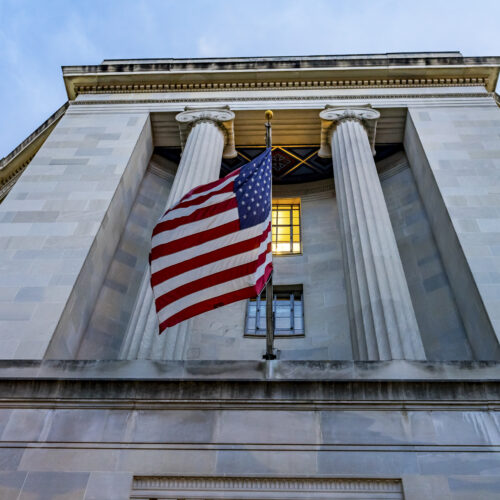Attorney General Holder calls on Congress to help remedy national indigent defense crisis

Pleading the Sixth: On August 12, 2013, United States Attorney General Eric Holder issued a nationwide challenge to overhaul our “broken” criminal justice system. Bold steps are needed to ensure equal justice, the Attorney General declared, including expanded Congressional right to counsel funding to address the on-going crisis in indigent defense. As a nation, we may not be able to spend our way out of the crisis, so Holder also gave specific ways to reduce the need for indigent defense services in the first place through increased diversion, reduced reliance on incarceration, and re-thinking the “war on drugs.” With the AG’s challenge to think big, the 6AC considers whether the time for a National Public Defense Center is at hand.
On August 12, 2013, U.S. Attorney General Eric Holder delivered a major speech before the American Bar Association House of Delegates, challenging criminal justice stakeholders to “break free of a tired status quo” and “challenge that which is unjust,” toward reforming America’s broken criminal justice systems. Declaring that, “too many Americans go to too many prisons for far too long, and for no truly good law enforcement reason,” Holder advocated a number of far-reaching policy changes to break the “vicious cycle of poverty, criminality, and incarceration,” that “traps too many Americans and weakens too many communities.”
Preeminent among those recommendations is the Attorney General’s clarion call that “prosecutors cannot – and should not – bring every case or charge every defendant who stands accused” of violating laws. Together with his serious questioning of the effectiveness of the now five-decades-old war on drugs, his desire to greatly expand diversion of people out of the formal criminal justice system would significantly impact America’s indigent defense systems that “continue to exist in a state of crisis.” Furthermore, the speech is the first time that the Attorney General challenged Congress to “expand existing indigent defense programs, provide access to counsel for more juvenile defendants, and increase funding for federal public defender offices.”
The state indigent defense crisis & the case for increased Congressional funding
The right to counsel in America exists on a broad continuum with public defender offices that meet national standards for the defense function (or, have evolved beyond them to develop innovative best-practices focusing on such things as a client’s broader life issues and other civil legal needs) making up a very small portion of the spectrum. The most prevalent manner for delivering indigent defense services in the United States is for a private attorney to handle an unlimited number of cases for a single flat fee under contract to the judge presiding over the lawyer’s cases.
Such contractual arrangements are rife with financial incentives for lawyers to do as little work on cases as possible. Generally, all trial expenses (experts, investigators, etc.) must be paid out of the same flat fee meaning that a lawyer’s take home pay is negatively impacted the more outside assistance he seeks. Often, lawyers in these “non-systems” take into account what they must do to please a judge in order to get the next contract rather than solely advocating on a defendant’s behalf. When lawyers triage the duty they owe each and every client, it is not uncommon for such attorneys to end up juggling several hundred cases all at the same time.
The scope of the problem is massive. There are 3,033 organized county or county-equivalent governments in the United States. The Department of Justice, Bureau of Justice Statistics reports that there are only 957 public defender offices in the country. Even accounting for the few contract systems that do meet national standards, it is simply a fact that a full 64% of counties (over 1,900 counties) operate “non-systems” when it comes to the constitutional right to counsel.
Even in those states that have moved beyond such flat fee contracts and established public defender offices, most offices suffer from excessive caseloads too. (For more information on struggling public defender offices, see our stories on Florida and Missouri.) Such excessive caseloads lead to one of two results. Either the court experiences inordinate delays, with defendants waiting months in jail at tax payers expense, or our courts become assembly lines to process poor people into jail without bothering to sort out the guilty from the innocent. When an innocent person sits in jail because her attorney did not have the time, ability or resources to do the job right, the real perpetrator remains on the streets to wreak havoc with public safety. Neither is acceptable.
As Holder himself states, “although incarceration has a significant role to play in our justice system – widespread incarceration at the federal, state, and local levels is both ineffective and unsustainable. It imposes a significant economic burden – totaling $80 billion in 2010 alone – and it comes with human and moral costs that are impossible to calculate.”
The federal indigent defense crisis & the case for Congress to fix the independence of the federal defenders as the means to secure adequate funding
For years, the Federal Defender System has been held out as a beacon to states for how to provide effective representation to the accused – and rightly so. Historically, federal defenders have had reasonable caseloads, are offered innovative training, and work in systems that provide support and supervision consistent with much of the American Bar Association, Ten Principles of a Public Defense Delivery System.
Yet, the system has always contained one major systemic problem – undue judicial interference.
Funding for and the administration of the federal public defender system falls within the auspices of the Judicial Conference of the United States and the Administrative Office of the U.S. Courts. This means that the federal defender system is directly accountable to the federal judiciary. When the recent “sequestration” hit, it was the judiciary that determined the federal defenders would shoulder a disproportionate amount of the funding cut to the judiciary’s budget. Furloughs and lay-offs have become the norm at federal defender offices across the country.
In 1981, the United States Supreme Court stated in Polk County v. Dodson, 454 U.S. 312, that government has a “constitutional obligation to respect the professional independence of the public defenders whom it engages.” Observing that “a defense lawyer best serves the public not by acting on the [government’s] behalf or in concert with it, but rather by advancing the undivided interests of the client,” the Court concluded in Polk County that a “public defender is not amenable to administrative direction in the same sense as other [government] employees.” Despite this, the federal defender system was earlier this year demoted from a directorate with the judicial branch to a Department of Program Services, further diminishing its ability to stave off further cuts.
And, much of this could have been predicted. In 1991, then-Chief Justice Rehnquist ordered a review of the Criminal Justice Act of 1964. The 1992 report of that review effort called for the removal of the undue judicial influence over the federal defender system, with the federal defenders to operate under an independent commission. However, the Judicial Conference rejected the recommendation and submitted a substitute report to Congress that did not even support a more limited suggestion of simply giving the federal defender system a separate budget.
Congress could fix the state and federal crises by creating a National Center for Public Defense
In his speech to the ABA House of Delegates, Attorney General Holder committed that he and the President will, in the coming months, reach out to Congressional members from both parties, as well as state criminal justice stakeholders, to reform criminal justice. We respectfully suggest that the President and Attorney General recommend that Congressional funding of state indigent defense systems could take many forms, from funding for more attorneys in the trenches, to funding for innovative training programs, like Gideon’s Promise, or even the creation of a National Center for Public Defense that has long been advocated, since 1979, by the American Bar Association.
As noted in the Constitution Project, National Right to Counsel Committee’s seminal report on the indigent defense crisis, Justice Denied, a national indigent defense center could “strengthen the services of publicly funded defender programs in all states by providing grants, sponsoring pilot projects, supporting training, conducting research, and collecting and analyzing data.” Indeed, just as the Department of Justice has grant making departments and also oversees the U.S. Attorneys, a national public defense center could provide the grant services advocated by both the National Right to Counsel Committee and the American Bar Association, and that center could house the federal defenders too. And, following national standards, independence could be ensured through having an independent commission overseeing the center.
Such an endeavor is certainly ambitious, especially given the limited amount of money currently going to indigent defense in comparison to prosecution and law enforcement. (For more on the federal criminal justice funding disparity, see our blog post on the 2012 GAO report here.) But, as the Attorney General stated, “we must recommit ourselves – as a country – to tackling the most difficult questions, and the most costly problems, no matter how complex or intractable they may appear.”


